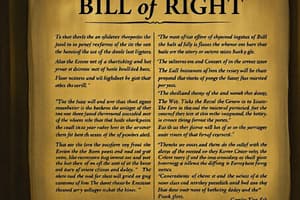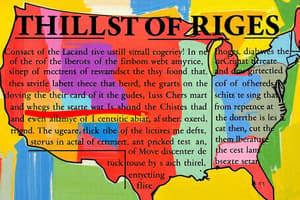Podcast
Questions and Answers
Which amendment prohibits double jeopardy and self-incrimination?
Which amendment prohibits double jeopardy and self-incrimination?
- 6th Amendment
- 4th Amendment
- 8th Amendment
- 5th Amendment (correct)
What principle does the 14th Amendment primarily endorse?
What principle does the 14th Amendment primarily endorse?
- Prohibition of Slavery
- Equal Protection (correct)
- Voting Rights
- Right to Privacy
Which case is known for formally establishing the right of privacy?
Which case is known for formally establishing the right of privacy?
- Griswold v. Connecticut (correct)
- Miranda v. Arizona
- Brown v. Board of Education
- Roe v. Wade
The Civil Rights Act of 1964 was primarily aimed at eliminating which of the following?
The Civil Rights Act of 1964 was primarily aimed at eliminating which of the following?
What does the term 'de facto' refer to?
What does the term 'de facto' refer to?
Study Notes
4th Amendment
- Protects against unreasonable searches and seizures.
- Requires warrants to be judicially sanctioned and supported by probable cause.
5th Amendment
- Guarantees the right to due process and prohibits self-incrimination.
- Protects against double jeopardy, ensuring individuals cannot be tried for the same crime twice.
6th Amendment
- Assures the right to a speedy and public trial by an impartial jury.
- Grants rights related to legal counsel, confrontation of witnesses, and informed charges.
8th Amendment
- Prohibits cruel and unusual punishment.
- Forbids excessive bail and fines.
Case that formally established the right of Privacy
- Griswold v. Connecticut (1965) recognized the right to privacy in marital relations concerning contraceptive use.
Fighting Words
- Refers to speech that is likely to incite immediate violence or an aggressive response.
- Not protected by the First Amendment as it poses a direct threat to public order.
Speech Plus
- Involves actions or conduct combined with speech, such as demonstrations or protests.
- Protected under the First Amendment, but regulations can be placed on the time, place, and manner of expression.
Prior Restraint
- Refers to government action that prohibits speech or other expression before it takes place.
- Generally found unconstitutional under the First Amendment unless there are extreme circumstances.
Civil Rights
- Focus on the protection of individuals from discrimination.
- Addresses equality and the right to participate in civil and political life without discrimination.
Civil Liberties
- Refers to individual rights protected from government interference.
- Encompasses freedoms such as speech, religion, and due process.
De jure
- Means "by law," referring to legally established policies or practices.
- Often signifies formal equality as defined by legislation.
De facto
- Means "in fact," describing situations that exist in reality, regardless of whether they are legally recognized.
- Often highlights inequalities or practices that occur despite legal provisions.
13th Amendment
- Abolished slavery and involuntary servitude in the United States.
- Ratified in 1865, providing a constitutional basis for civil rights.
14th Amendment
- Grants citizenship and equal protection under the law to all individuals born or naturalized in the U.S.
- Prohibits states from denying any person the equal protection of the laws.
15th Amendment
- Ensures that the right to vote cannot be denied based on race, color, or previous condition of servitude.
- Ratified in 1870, aimed at securing voting rights for African American men.
Civil Rights Act of 1964
- Landmark legislation that outlawed discrimination based on race, color, religion, sex, or national origin.
- Prohibited segregation in schools, employment, and public accommodations, marking a significant advancement in the civil rights movement.
Studying That Suits You
Use AI to generate personalized quizzes and flashcards to suit your learning preferences.
Description
This quiz explores important amendments to the U.S. Constitution, including the 4th, 5th, 6th, 8th, and Civil Rights Amendments. It also covers key concepts such as civil liberties, civil rights, and landmark cases that have shaped American law. Test your knowledge about these foundational principles of democracy and individual rights.




